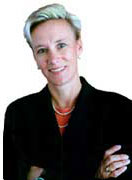7 Habits of Highly Effective People (on CD) by Stephen Covey
Delivered with one of the most genuine voices in the personal development field, the principles in Covey's 1989 bestseller are placed in a new frame by the author's thoughtful comments before and after the unabridged text. The meat of this thinking is well known: Take the initiative, align behavior with beliefs, form partnerships with people you understand and respect, develop yourself. These lessons are still relevant to finding one's rudder in a world that doesn't tell one how and provides no compass. With corporations obsessing over this week's numbers instead of their human capital, Covey's talent for speaking to our deepest aspirations takes center stage again in a lively audio learning experience. T.W. © AudioFile 2004, Portland, Maine-- Copyright © AudioFile, Portland, Maine

